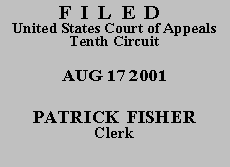

| JEAN HINDERMAN,
Plaintiff-Appellant, v. F. WHITTEN PETERS, Secretary, U.S. Department of the Air Force, Defendant-Appellee. |
|
Jean Hinderman appeals from the district court's order dismissing her Title VII complaint for lack of subject matter jurisdiction pursuant to Fed. R. Civ. P. 12(b)(1). We have jurisdiction over this appeal by virtue of 28 U.S.C. § 1291. We review the court's dismissal de novo. See U S West, Inc. v. Tristani, 182 F.3d 1202, 1206 (10th Cir. 1999).
Ms. Hinderman was originally employed by defendant as a civilian clerk at Tinker Air Force Base, but was laid off in 1997 during a reduction in force. She filed suit under Title VII, 42 U.S.C. § 2000e-5(f)(3), alleging racial discrimination. That suit was terminated following a written settlement agreement pursuant to which defendant reinstated appellant to a specified position. Ms. Hinderman's employ was again terminated some nine months later. As provided for in the settlement agreement, she notified the Director of the Air Force Civilian Appellate Review Organization, alleging that defendant had violated the terms of the settlement agreement. The Director issued a written final agency decision denying Ms. Hinderman's claim that the settlement agreement had been breached. In that decision, the Director notified her that her latest termination was a "new issue," and that she should file a new complaint with defendant's Chief EEO Counselor. Aplt. App. at 14.
Ms. Hinderman did not contact the EEO counselor, but instead filed suit in federal court, ultimately asserting two claims: that defendant had breached the settlement agreement and that it had terminated her employment "in a racially discriminatory manner." Id. at 20. Defendant moved to dismiss the complaint for lack of subject matter jurisdiction because Ms. Hinderman had failed to bring her complaints to an agency EEO counselor and file a formal discrimination complaint with the agency, as required by Equal Employment Opportunity Commission (EEOC) regulations. See id. at 27. The district court agreed with defendant that Ms. Hinderman had not exhausted her administrative remedies and that such exhaustion is a "jurisdictional prerequisite to a lawsuit alleging employment discrimination under Title VII." Id. at 47. The court also noted that Ms. Hinderman's letter to the Director of the Air Force Civilian Appellate Review Organization could not satisfy her duty to exhaust administrative remedies because it did not allege racial discrimination, but claimed only that defendant had violated the terms of the parties' settlement agreement. The district court dismissed Ms. Hinderman's complaint and this appeal followed.
This circuit has held that Title VII's exhaustion requirements do not apply to "purely contractual" claims seeking to enforce Title VII settlement agreements. See Cisneros v. ABC Rail Corp., 217 F.3d 1299, 1305 (10th Cir. 2000).(2) Because Cisneros may operate in this case to excuse Ms. Hinderman from exhaustion, we reverse the district court's dismissal of her complaint for failure to exhaust her administrative remedies.
On remand, the district court should first determine the nature of Ms. Hinderman's claims. In Cisneros, we distinguished situations where a plaintiff sought to bring new claims of discrimination in connection with an alleged breach of a settlement agreement. See id. (distinguishing Blank v. Donovan, 780 F.2d 808, 809-10 (9th Cir. 1986)). Here, although Ms. Hinderman's complaint facially includes allegations of both a breach of the settlement agreement and discriminatory termination under Title VII, her letter to the Director of the Air Force Civilian Appellate Review Organization alleged only breach of the settlement agreement. At this stage of the proceedings, it is unclear whether she is alleging new claims of discrimination to which, arguably, the Title VII exhaustion requirements apply, or whether she is simply attempting to reinstate her previous discrimination claims.
Further, should the district court determine that Ms. Hinderman's claims are not solely contractual in nature and therefore not excused from the Title VII exhaustion requirements by the application of Cisneros, the court should address her argument that she is entitled to bring suit pursuant to Title VII because defendant issued a final agency action letter on her claim that the settlement agreement was violated. Finally, if Cisneros applies to excuse Ms. Hinderman from exhausting her Title VII administrative remedies, the district court should consider whether federal jurisdiction exists. This court has not decided whether Title VII provides a jurisdictional basis in cases alleging only breach of a Title VII settlement agreement. See Cisneros, 217 F.3d at 1302; cf. Morris v. City of Hobart, 39 F.3d 1105, 1110-12 (10th Cir. 1994) (rejecting notion that Title VII provides independent jurisdictional ground for breach of contract claims arising from private settlement agreements); Snider v. Circle K Corp., 923 F.2d 1404, 1407 (10th Cir. 1991) (holding federal common law applies to Title VII settlement agreements, and noting that such agreements are "inextricably linked to Title VII").
We REVERSE the judgment of the United States District Court for the Western District of Oklahoma and REMAND this case for further proceedings consistent with this order.
Entered for the Court
Circuit Judge
*. This order and judgment is not binding precedent, except under the doctrines of law of the case, res judicata, and collateral estoppel. The court generally disfavors the citation of orders and judgments; nevertheless, an order and judgment may be cited under the terms and conditions of 10th Cir. R. 36.3.
2. Although Cisneros was decided five months before the district court's ruling, neither the parties nor the court apparently contemplated its applicability to this case. We asked the parties to file simultaneous supplemental appellate briefs on this point.